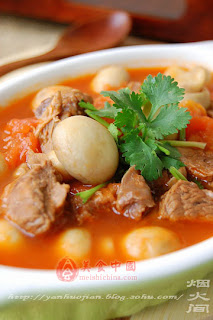
Tuesday, December 2, 2008
Chinese food culture of tea culture

Chinese Food Culture of The Origin of Moon Cakes

The Moon Cakes is a representative of the Chinese food culture.
Legend has it that in ancient China, the emperor will have memorial day in the spring, autumn festival ceremony on the system. In public, the Mid-Autumn Festival every August, but also about worship, or on the festival customs. "August Shiwu Yue Yuen children, moon cakes and sweet incense," saying this out of the Mid-Autumn Night of the urban and rural customs of the people to eat moon cakes. Moon Festival was first used for offerings from the moon and then there is the Mid-Autumn full moon and tasting moon cakes, as a symbol of family reunion, the moon will slowly become a holiday gift.

At that time, it was agreed that the Turpan to the emperor of the Tang Dynasty offer a celebration cake. Li Yuan dynasty took over the beautiful cake boxes, and come up with a round cake, and laughter in the air means the moon said: "The cake should be invited Hu toad." The finished cake to eat together Qun Chen.
To the development of the moon today, many more varieties, the flavor varies from place to place. One-Beijing and the Soviet Union-style, wide-tide-moon, and so widely around the north-south China's people like eating.
Moon symbolizes the reunion, the Mid-Autumn Festival is certainly the food products. Night at the festival, people also eat more watermelon, the fruit of the reunion, and other fruits, Qi Zhu happy family life, the sweet, safe ......
Monday, December 1, 2008
About Chinese Food Culture

From History, Chinese food culture stretching more than 170 million years, is divided into raw, cooked food, natural cooking, science and cooking 4 stages of development, the introduction of more than 60,000 kinds of traditional dishes, more than 20,000 kinds of industrial food, and the Feast of the colorful streamer Cai Yi-school flavor, was "cooking the Kingdom" in the world.
From the connotation, the Chinese food culture relating to the development of the food source and use of utensils to use and innovation, food production and consumption, food service and hospitality, restaurant and food industry and business management, as well as the new prime minister and restaurants , Restaurants and literary arts, food and life, the relationship between the state and so on, extensive deep.
From the extension, the Chinese food culture and techniques from the era, economic and geographical, ethnic and religious, food and utensils, and consumption levels, and functions of folk and other point of classification, showed a different cultural tastes, reflect the different Value, colorful.
From the characteristics of view, Chinese food culture has a different food culture of various countries overseas natural beauty.
From the impact, the Chinese food culture have a direct impact on Japan, Mongolia, North Korea, South Korea, Thailand, Singapore and other countries, the East is the cultural circle of the axis of diet; At the same time, it also indirectly affect Europe, the Americas, Africa and Oceania, China, like the vegetarian culture, tea culture, vinegar sauce, pasta, Diet, ceramic tableware and soybeans, have the benefit of hundreds of billions of people around the world.
Chinese food culture is a long-standing culture of the region; Chinese people of all ethnic groups in more than 100 million years of productive life and practice, in the development of the food source, development tableware, food conditioning, nutrition, health and diet, such as aesthetic aspects of creation, accumulation and Impact on neighboring countries and the world's material wealth and spiritual wealth. Chinese food culture is the culture of the world!
Category
Followers
Labels
- chinese culture (6)
- chinese dragon (1)
- chinese dragon culture (1)
- chinese food (3)
- chinese food culture (3)
- chinese foods (2)
- chinese Kong Fu (1)
- Chinese Medicine (1)
- Chinese Medicine Culture (1)
- Chinese Medicine history (1)
- chinese tea (1)
- chinese tea culture (1)
- chinese wushu (1)
- chinese wushu culture (1)
- dragon culture (1)
- Mid-Autumn Festival (1)
- Moon (1)
- Moon Cakes (1)
- tea (1)
- tea culture (1)
- Western medicine (1)
- Wushu (1)
- wushu culture (1)


